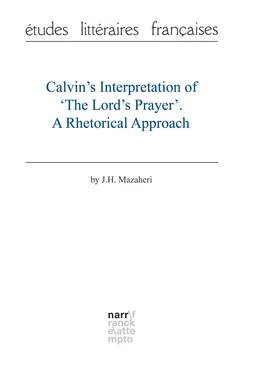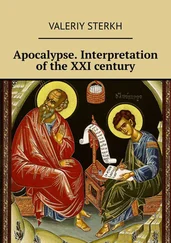Professor J.H. Mazaheri - Calvin's Interpretation of 'The Lord's Prayer'. A Rhetorical Approach
Здесь есть возможность читать онлайн «Professor J.H. Mazaheri - Calvin's Interpretation of 'The Lord's Prayer'. A Rhetorical Approach» — ознакомительный отрывок электронной книги совершенно бесплатно, а после прочтения отрывка купить полную версию. В некоторых случаях можно слушать аудио, скачать через торрент в формате fb2 и присутствует краткое содержание. Жанр: unrecognised, на английском языке. Описание произведения, (предисловие) а так же отзывы посетителей доступны на портале библиотеки ЛибКат.
- Название:Calvin's Interpretation of 'The Lord's Prayer'. A Rhetorical Approach
- Автор:
- Жанр:
- Год:неизвестен
- ISBN:нет данных
- Рейтинг книги:4 / 5. Голосов: 1
-
Избранное:Добавить в избранное
- Отзывы:
-
Ваша оценка:
- 80
- 1
- 2
- 3
- 4
- 5
Calvin's Interpretation of 'The Lord's Prayer'. A Rhetorical Approach: краткое содержание, описание и аннотация
Предлагаем к чтению аннотацию, описание, краткое содержание или предисловие (зависит от того, что написал сам автор книги «Calvin's Interpretation of 'The Lord's Prayer'. A Rhetorical Approach»). Если вы не нашли необходимую информацию о книге — напишите в комментариях, мы постараемся отыскать её.
Calvin's Interpretation of 'The Lord's Prayer'. A Rhetorical Approach — читать онлайн ознакомительный отрывок
Ниже представлен текст книги, разбитый по страницам. Система сохранения места последней прочитанной страницы, позволяет с удобством читать онлайн бесплатно книгу «Calvin's Interpretation of 'The Lord's Prayer'. A Rhetorical Approach», без необходимости каждый раз заново искать на чём Вы остановились. Поставьте закладку, и сможете в любой момент перейти на страницу, на которой закончили чтение.
Интервал:
Закладка:
Jesus, he specifies, also teaches us, not only the way (“la façon”), but also the style (“stile”) of praying, and so proposes us a model or form (“formulaire”) of prayer. In fact, it is the Father himself who teaches us this prayer through his beloved Son. The reason is that He knows that we need such a prayer. So, it is out of kindness, since we do not even know what to say to God and how to say it. Therefore, Jesus incites (“admoneste”) and urges us (“exhorte”) to go back to the Father (“de nous retourner à luy”) for all our needs. We are like helpless children—the words “povreté” and “misère” stress this idea—who need to go to their fathers for help. Calvin stresses the fact that we ourselves do not know what our needs are, i.e. what is useful and profitable for us to ask God (“ce qui est utile et profitable”), that which makes “The Lord’s Prayer” all the more important for our happiness. It also shows God’s goodness in teaching it to us.
In his Commentaries , Calvin raises an interesting issue with regard to a difference existing between the Gospels of Luke and Matthew. He reminds the fact that in the former, one of the disciples asks Jesus how to pray, whereas in the latter it is the Lord himself who decides to teach them the Lord’s Prayer without being asked: “S. Luc dit qu’il en fut requis, & S. Matthieu l’introduit enseignant ceci sans en estre prié” ( Commentaires 124).2 Concerning Luke’s reference to John the Baptist, he gives the following explanation:
Quant à ce que sainct Iean avoit baillé à ses disciples une formule particuliere de prier, ie pense qu’il l’avoit faite selon que le temps le requeroit. Il est tout certain que les choses estoyent lors fort corrompues entre les Iuifs; pour le moins toute la religion estoit tellement deschuë, qu’il ne se faut pas fort esbahir si la vraye et pure maniere de prier estoit prattiquee par bien peu de gens. Davantage, pour ce que lors la Redemption promise approchoit, il estoit besoin que les esprits des fideles fussent resveillez à l’esperance et desir d’icelle en priant. Ainsi donques il se peut faire que S. Iean avoit dressé quelque certaine priere, recueillie de divers passages de l’Escriture, laquelle estoit convenable pour ce temps-la, et approchoit de plus pres du Regne spirituel de Christ, qui commençoit desia à estre revelé. ( Commentaires 124)3
First of all, Calvin refuses to explain the difference between Matthew’s exposition and that of Luke. Maybe, he points out, Matthew just omitted mentioning the circumstance Luke describes in his Gospel [“il se peut faire que sainct Matthieu a omis la circonstance et l’occasion laquelle S. Luc touche, combien que de cela ie n’en veux debattre avec personne” ( Commentaires 124)]. Secondly, commenting on Luke, he believes that at the time of John the Baptist, a prayer based on the Scripture had been proposed by the Prophet because the Jews were confused and there was too much corruption among them (“Il est tout certain que les choses estoyent for corrompues entre les Iuifs”) and that their religion was perishing (“toute la religion estoit tellement deschuë”). So the prayer John had taught his disciples, which was based on the Scripture, had certainly been useful in view of that time. But when Christ came, that prayer had to be replaced by the one the Lord prescribed. Calvin suggests that the disciples should not have compared John with Jesus in the first place. The former was just a prophet and did what he could under those circumstances. However, the spiritual kingdom of Christ was approaching and about to be revealed (“commençoit desia à estre revelé”), i.e. the Lord was to show himself. Therefore, we must not think of John’s prayer anymore after the coming of Jesus.
In The Institutes Calvin underscores God’s goodness (“bénignité”, “mansuétude”), as He teaches us through the Son how to pray and what to say to Him. This is a great consolation for us, he declares (“une singulière consolation”), for in this way we also know what we ought not to request from Him. Indeed, we must not ask Him anything improper (“illicite”), anything which importunes Him (“importune”), nor anything extravagant (“estrange”)—in other words something not religious. On the other hand, the reference to a dialogue, supposed to be by Plato, is also noteworthy, as it shows the great respect Calvin had for the Greek philosopher and how close he believes the latter subconsciouly was to Christ:
Platon voyant l’ignorance des hommes en leurs désirs et souhaits qu’ils font à Dieu, lesquels souvent ne leur peuvent estre concédez sinon à leur grand dommage, déclaire que la meilleure manière de prier est celle qu’a baillé un Poète ancien, de requérir Dieu de nous faire le bien, soit que nous le demandions ou ne le demandions pas, et vouloir destourner le mal de nous, mesmes quand nous désirerions qu’il nous advinst. ( Institution III, xx, 34, 377)4
The reference to the Second Alcibiades is quite significant. It does not matter to us whether this dialogue was written by a disciple of Plato in the 3 rdor 2 ndcentury B.C. and not by himself, for whoever the author is, the text belongs to Pre-Christian times. The fact that Calvin compares a Christian text on prayer with a pagan text is interesting by itself.5 It reveals that to the Reformer, God—there is just one—is present in this pagan work. Now, the Second Alcibiades is focused on prayer, and the comparison between the two texts is quite appropriate. In this dialogue, Alcibiades, a young man going to the temple to pray, accidentally meets Socrates, who strikes up a conversation with him on the subject of prayer. The philosopher would like to know whether Alcibiades knows what to pray for, or what to ask God. The difference between Socrates and Jesus is that the former indirectly teaches in the form of dialogue and reasoning, whereas Jesus just tells us what to do, and does it with much greater authority. Calvin does not go as far as truly comparing a wise man and a great thinker with God. He does not compare reasoning with faith, but realizes that Socrates’ conception of prayer is very close to that of Christianity; so would be, as a consequence, his understanding of god. Thus, Socrates says to Alcibiades that if one is not aware of what is really good for one’s soul, one might pray for something evil. Such people may face misfortune, and then blame the gods for what happened to them:
I question therefore if men are not really wrong in blaming the gods as the authors of their ills, when ‘they themselves by their own presumption’—or unwisdom, shall we say?—‘have gotten them more than destined sorrows.’ It would seem, at any rate, Alcibiades, that one old poet had some wisdom; for I conceive it was because he had some foolish friends, whom he saw working and praying for things that were not for their advantage, though supposed to be by them, that he made a common prayer on behalf of them all, in terms something like these: ‘King Zeus, give unto us what is good, whether we pray or pray not; [B]ut what is grievous, even if we pray for it, do thou avert.6
Another interesting fact is that Socrates himself refers to Homer, whose Zeus, “the father of gods and men,” thus complains at the beginning of the Odyssey :
My word, how mortals take the gods to task!
All their afflictions come from us, we hear.
And what of their own failings? Greed and folly
double the suffering in the lot of man.
See how Aigísthos, for his double portion,
stole Agamémnon’s wife and killed the soldier
on his homecoming day. And yet Aigísthos
knew that his own doom lay in this. We gods
Читать дальшеИнтервал:
Закладка:
Похожие книги на «Calvin's Interpretation of 'The Lord's Prayer'. A Rhetorical Approach»
Представляем Вашему вниманию похожие книги на «Calvin's Interpretation of 'The Lord's Prayer'. A Rhetorical Approach» списком для выбора. Мы отобрали схожую по названию и смыслу литературу в надежде предоставить читателям больше вариантов отыскать новые, интересные, ещё непрочитанные произведения.
Обсуждение, отзывы о книге «Calvin's Interpretation of 'The Lord's Prayer'. A Rhetorical Approach» и просто собственные мнения читателей. Оставьте ваши комментарии, напишите, что Вы думаете о произведении, его смысле или главных героях. Укажите что конкретно понравилось, а что нет, и почему Вы так считаете.












